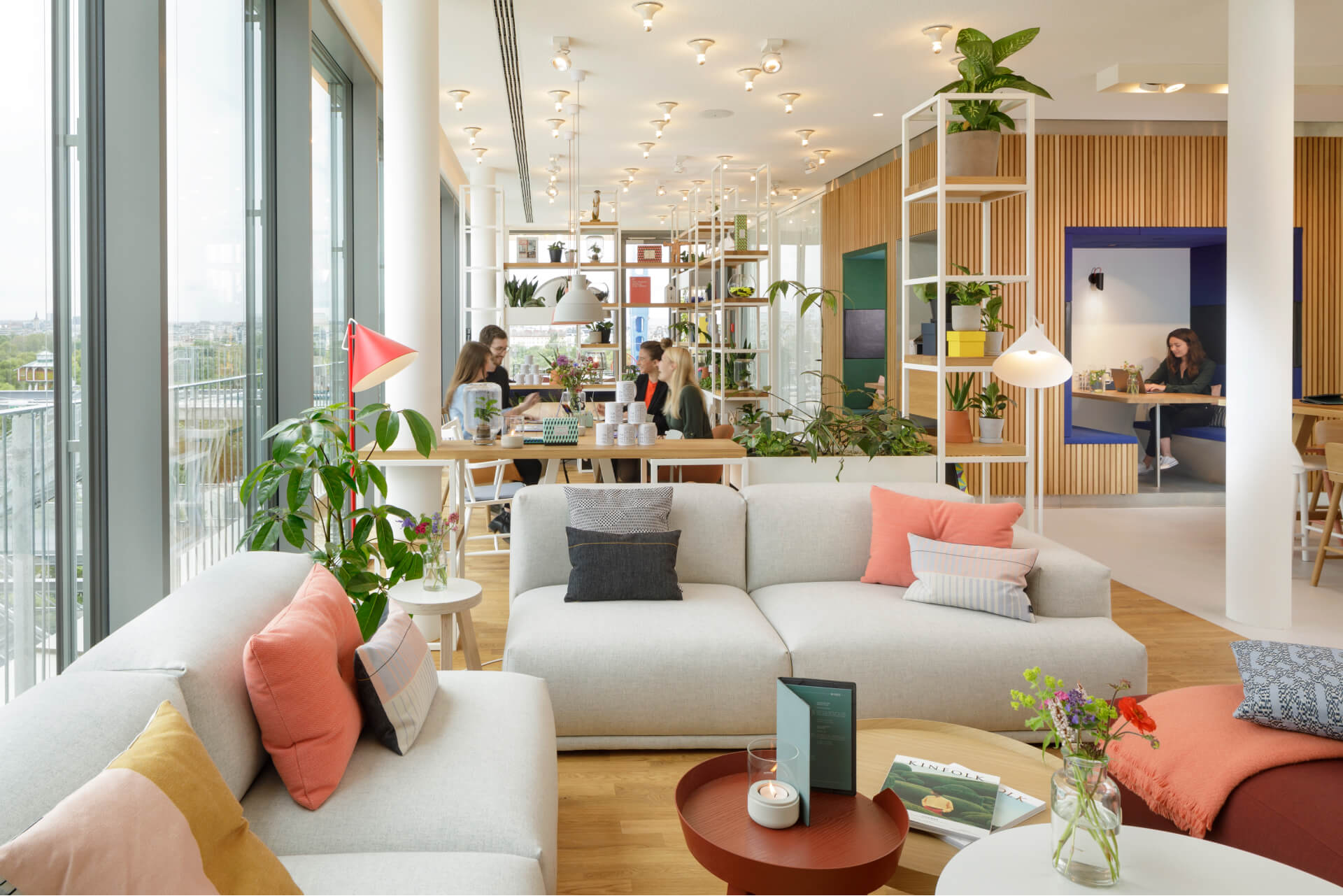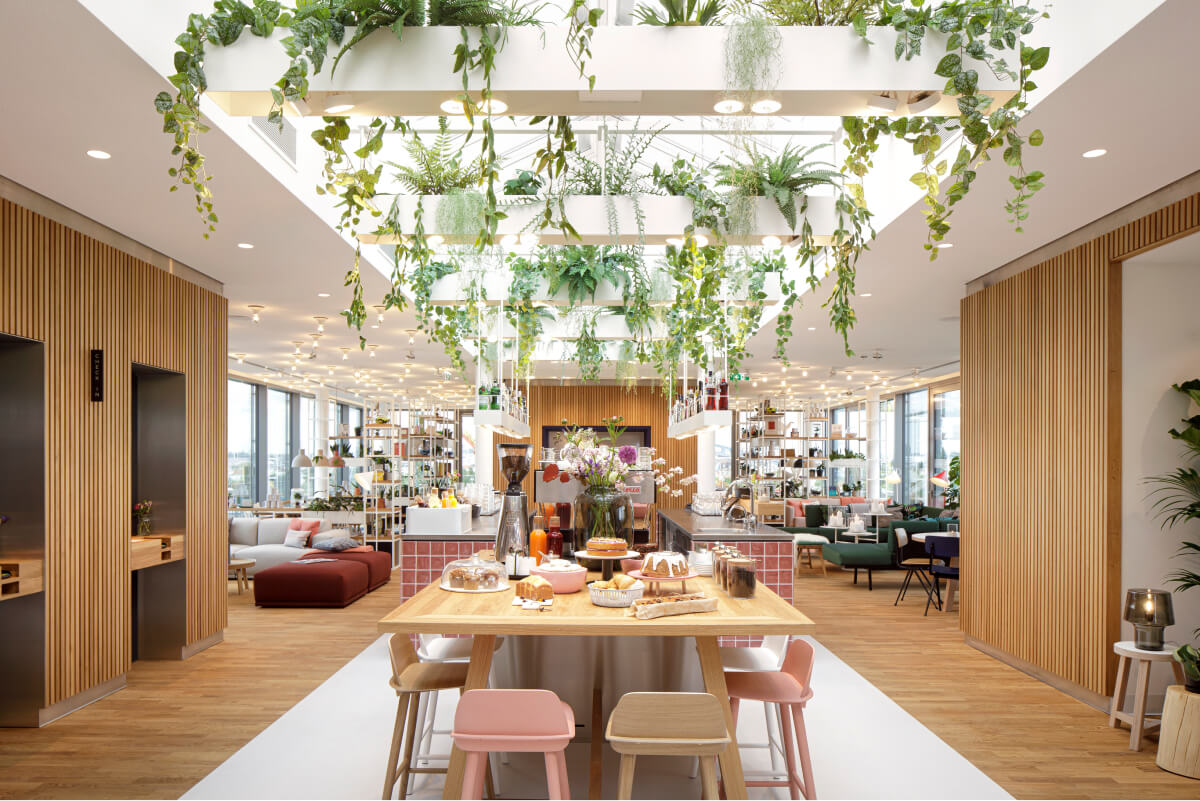
“One of the key things we learned is we’re no longer just selling rooms as a hotel,” Reinier Bunnik, Operations Director at Zoku, told us. “We’re selling time and square meters, and this is where we had the opportunity to provide what we call ‘hybrid hospitality.’”
Zoku is a fascinating story of hospitality provided for the growing population of globetrotting professionals, digital nomads, and remote workers. Opened in 2016, the Dutch brand invented a new category in the hotel industry with its home-office hybrid concept, Zoku Loft.
The brand aims to support the future of work with its multipurpose business facilities that allow employees to connect while working from anywhere. The concept, which goes beyond the standard hotel goal of “putting heads in bed”, has won numerous awards and received glowing reviews from guests for its vibrant Social Spaces, sustainability initiatives, and unique community that facilitates connections between residents and locals.
Reinier knows something about that globetrotting life himself, having lived on three continents and worked at everything from 3-star hotels to 5-star resorts. “I think I'm probably a good example of a hospitality nomad,” he laughed. “One of the greatest things about hospitality is that you can throw a dart on the global map and you can probably work there. This industry certainly provides the greatest adventures and stories to tell in the bar at night.”

While the Zoku brand started with incredible design, savvy operators like Reinier understand it takes more than a cool concept to build a thriving brand. There must be systems behind the scenes that allow you to deliver on the promise of your brand experience. And they need to do that in a way that helps you grow.
“When you’re a young company you end up with a bunch of systems and tools because someone along the way thought it was a good idea, but it often turns out to be a house of cards,” Reinier observed. “We needed a core, integrated technology stack that would sustain the growth and scalability of our brand.”
Without systems that interacted with each other, reporting on performance was challenging. “At some point, you have to evaluate if things are working or not. You can’t just be happy-go-lucky and hope things work out.”
With big plans for growth ahead, Reinier realized the infrastructure they had was not going to support the business they wanted to build. Specifically, their technology needed an upgrade to help them realize their goal of selling time and space instead of just traditional rooms.
A core piece of technology for hospitality businesses is the Point of Sale (POS) solution.
“POSs tend to specialize either in the restaurant world or the hotel world,” Reinier noted. “But what we have with our WorkLofts and co-working with a breakfast, lunch, and dinner operation - required something else. Zoku is a staff-light concept, so I couldn't have multiple people serving each of our terraces.”
In this fast-moving, complex operation, ease of updating inventory was important. “When we run out of something we need to update it quickly because people are ordering via QR code.”
Running an operation in multiple countries with a global customer base also required technology that supported that. “Taxes are different across the globe, and not every system can support this properly,” Reinier shared as an example. “I needed something that could translate between currencies and taxes to give me a real-time report on all assets and locations.”

The search for a new solution started with these operational needs and the goal of providing modern hospitality in line with their brand promise.
Early in the process, Reinier talked with others across the organization, from revenue management to on-property teams. “It’s an approach that worked for us developing our rooms, and one I wanted to apply to our selection of technology.”
Quickly, they realized their requirements would be significant. Further, they didn’t want a patchwork of systems that didn’t work well together.
“We decided we wanted to build everything around our property management system (PMS), including the POS.” This approach would allow them to scale growth, instead of compounding problems as their brand got larger.
Focusing on the integration with the PMS helped provide a shortlist of possible POS solutions. After evaluating solutions against their requirement list, Infrasys emerged as the best fit because of the product itself and the company behind it. “With Shiji Group behind it, we knew it would continue to be developed with international growth in mind. That was huge for us.”
With a solution identified, it was time for implementation.

“Onboarding a new POS can be really tricky,” Reinier observed.
The support Shiji Group provided during this process made it easier because of the approach they took. “They led by asking, ‘What are you trying to achieve?’ rather than just saying this is how others did it and how we should too. Onboarding included a lot of discussions of our goals and them suggesting possible solutions for achieving them.”
Having the Shiji onboarding team on site was also helpful. “For as many systems as I’ve seen implemented, there are so many little details that only come to light once you get started with the onboarding, or when training your team managers and admins. So it was great to have them here for that.”
Once set up, onboarding, and training was completed, Shiji didn’t just leave the Zoku team on their own. “There’s a constant open dialogue between our teams,” Reinier shared. “They’re always looking for new ways to help us reach our goals.”

With the technology in place, Reinier has enabled his teams to think about optimizing performance. All the data is at their fingertips and can be configured into any report needed. These capabilities are vital to helping Zoku deliver on its brand promise and capitalize on the opportunity it sees.
“We have 168 hours each week to make money,” Reinier noted. “Office leases are being canceled left and right and people are coming to work in hotels. We saw this opportunity years ago, but the pandemic accelerated this trend. We’ve proven you can use our rooms as offices. Coworkers use our WorkLofts to work in a private space with strong wifi and a great cup of coffee.”
Precision in reporting matters when optimizing for revenue in this new model.
“If I'm all about co-working and people sharing, I want to know if the average occupancy of a large round table is only one or two people.
That might mean I need to change the setup.” Reinier and his team have also learned some surprising things this way. “Turns out that the ping pong table is quite a nice revenue-generating table as well!”
The Zoku team is benefiting from this insight daily. “This morning I had a brand call with the teams on-site, where we started thinking about how we can optimize our average spend for dinner because we can clearly see our top selling products and the timeline of products sold,” said Reinier. “It's amazing.”

“One of Zoku’s values is ‘always beta’,” Reinier shared in closing. “It's nice when you find a partner like Shiji Group that understands and operates like this. We’re proud of what we’ve achieved, but all agree that we want to continue to learn.”
With three properties open now, Reinier sees ideas coming from his Vienna location that he can implement in Amsterdam and Copenhagen, and vice versa. And the same is true with Infrasys as a technology partner.
“The platform approach allows a great idea from a single hotel to be shared with the entire platform, enabling constant learning and improvement.”
Shiji Group is a multinational technology company that provides software solutions and services for enterprise companies in the hospitality, food service, retail, and entertainment industries, ranging from hospitality technology platforms, hotel management solutions, food and beverage, and retail systems, payment gateways, data management, online distribution and more. Founded in 1998 as a network solutions provider for hotels, Shiji Group today comprises over 5,000 employees in 80+ subsidiaries and brands in over 31 countries, serving more than 97,000 hotels, 200,000 restaurants, and 600,000 retail outlets.
Zoku has invented a new category within the hotel industry with its home-office hybrid concept and award-winning Zoku Loft. Opened in 2016 by Dutch entrepreneurs Hans Meyer and Marc Jongerius, Zoku is named after the Japanese word for family, tribe or clan. Zoku facilitates international living, working and conscious traveling for the growing population of globetrotting professionals, digital nomads and remote workers. Its multipurpose business facilities make it a hospitality frontrunner in the future of work, providing hybrid work solutions for employees to reconnect while working-from-anywhere. The bold concept, which goes far beyond the standard hotel proposition of “putting heads in bed”, has won numerous awards, received rave reviews from guests and is praised for its vibrant Social Spaces, sustainability initiatives and unique community that facilitates connections between residents and locals. Zoku achieved B Corp certification in 2018, becoming one of the first hotels in the world to receive this recognition, and was voted “one of the 25 coolest hotels in the world” by Forbes. Zoku expanded to include two new locations in Copenhagen and Vienna in 2021 and will soon add Paris to its portfolio of European hubs in 2022.
Zoku, a Dutch hotel brand that invented the home-office hybrid concept, aims to support the future of work with multipurpose business facilities that allow employees to connect while working from anywhere. The brand has won numerous awards and received glowing reviews from guests. Zoku's Operations Director, Reinier Bunnik, realized the infrastructure they had was not going to support the business they wanted to build. Specifically, their technology needed an upgrade to help them realize their goal of selling time and space instead of just traditional rooms. They chose Infrasys POS because of its ability to integrate with their property management system and support international growth. Shiji's approach to onboarding helped make the process smoother.
Zoku caters to the growing population of globetrotting professionals, digital nomads, and remote workers. The brand's concept goes beyond the standard hotel goal of "putting heads in bed," with its multipurpose business facilities facilitating connections between residents and locals. Zoku's Operations Director, Reinier Bunnik, is a good example of a hospitality nomad, having lived on three continents and worked at everything from 3-star hotels to 5-star resorts.
The rich text element allows you to create and format headings, paragraphs, blockquotes, images, and video all in one place instead of having to add and format them individually. Just double-click and easily create content.
A rich text element can be used with static or dynamic content. For static content, just drop it into any page and begin editing. For dynamic content, add a rich text field to any collection and then connect a rich text element to that field in the settings panel. Voila!
Headings, paragraphs, blockquotes, figures, images, and figure captions can all be styled after a class is added to the rich text element using the "When inside of" nested selector system.
See how Shiji enables hospitality businesses with a complete and modern technology stack that is secure, scalable, and ready for the future.
Click below to find out all the ways Shiji can help your hospitality, food service, retail, or entertainment business thrive.